
Staying responsive in a world of need
MY STORY Living the impossible dream FEATURE Do we need rewilding? FAITH TALK Preventing compassion fatigue Vol. 005 | No. 05 24 February 2024 AUD $1.00 PRINT POST APPROVED PP100001474 salvosonline.org.au
Compassion fatigue

Look deep into nature and then you will understand everything better.
– Albert Einstein
The Salvation Army is about giving hope where it’s needed most.
What is The Salvation Army?
The Salvation Army, an international movement, is an evangelical part of the universal Christian Church.
Vision Statement
Wherever there is hardship or injustice, Salvos will live, love and fight alongside others to transform Australia one life at a time with the love of Jesus.
Mission Statement
The Salvation Army is a Christian movement dedicated to sharing the love of Jesus by:
• Caring for people
• Creating faith pathways
• Building healthy communities
• Working for justice

The Salvation Army Australia acknowledges the Traditional Owners of the land on which we meet and work and pay our respect to Elders, past, present, and future. We value and include people of all cultures, languages, abilities, sexual orientations, gender identities, gender expressions, and intersex status. We are committed to providing programs that are fully inclusive. We are committed to the safety and well-being of people of all ages, particularly children.
Salvos Magazine
Founders William and Catherine Booth
Salvation Army World Leaders
General Lyndon and Commissioner Bronwyn Buckingham
Territorial Leader Commissioner Miriam Gluyas
Secretary for Communications and Editor-In-Chief
Colonel Rodney Walters
Publications Manager Cheryl Tinker
Editor Simone Worthing
Graphic Designer Ryan Harrison
Enquiry email publications@salvationarmy.org.au
All other Salvation Army enquiries 13 72 58
Press date 9 February 2024
Printed and published for The Salvation Army by Commissioner Miriam Gluyas at Focus Print Group, South Granville, NSW, Darug Nation lands.




Compassion fatigue
It can be quite overwhelming to look around our world, our country and our local communities and see so many tragedies, complex problems, suffering and pain. We want to help; we want to see a peaceful world where everyone can work together and flourish and we want the suffering to end. It’s not easy to stay engaged and responsive when, despite our care and desire for change, the constant and graphic stream of war, natural disasters, crime and hate fill our phones, TVs and computers. Compassion fatigue and overwhelm is real.
In this edition, we feature stories on compassion fatigue from two different perspectives. This includes some tips on refilling the ‘compassion cup’ as well as looking after ourselves in the process.
As World Wildlife Day approaches (3 March), our environmental expert Melanie-Anne Holland writes about connection – with God and with nature – and how it can help us become more complete and whole in an often dehumanised and technological world.
For these stories and more, go to salvosonline.org.au
Simone Worthing Editor
My Story [12] Heading H.O.M.E Faith Talk [10] Preventing compassion fatigue Feature [4] Keeping compassionate in a world of need
CONTENTS 3 24 F EBR u AR y 2024
salvosonline.org.au
Keeping compassionate in a world of need
Managing the stress of seeing others suffer
By Faye Michelson
We want to care. We really do. But what can you or I, just normal people, do in the face of so much need around the world, around Australia, and even around our own neighbourhoods? It’s overwhelming to think about it. Sometimes we just need to switch off … don’t we?
The Oxford English Dictionary defines compassion as the feeling or emotion when a person is moved by the suffering or distress of another and by the desire to relieve it.
Compassion
fatigue is a term for the physical, emotional and psychological impact that comes from helping others or from being exposed to traumatised individu als. It was initially used to explain the emotional burden shouldered by health care professionals and social workers, but now has been expanded to
describe the desensitisation of public concern for social problems.
It seems counterintuitive to care less about what’s happening around us when, thanks to the constant news cycles available on our phones and computers, we can access information and vision of world events as they happen. Earthquakes, floods, war –we can see it all whenever we want.

And that’s why many of us find ourselves in the compassion fatigue cycle. We hear, we read, we see. We’re saddened, horrified, angered. Compassion fatigue is a survival strategy to protect us from feeling overwhelmed and depressed by the need around us, explains counsellor Cliff Worthing.

Cliff was part of a team of Salvos who last year provided debriefing and counselling to Salvation Army officers living and working in a war zone.
“We facilitated discussions on resilience
SALVOS MAGAZINE 4 FEAT u RE
and how they could cope through such tough times, as well as spending time with people who were dealing with the trauma of war,” he says.
As they had never lived in a war zone, the team was careful not to give advice but rather provide safe spaces to ask participants questions to encourage sharing and discussion.
“Our team took the time to talk about our feelings and this really helped to process what was going on for each of us.
“I don’t think we became overwhelmed because we were focused on the participants’ needs for that short period of time. As well as the tough conversations, we tried to have ‘normal’ chats about family, culture and hobbies and do some everyday things like walks, and eating together. This gave them, and us, a chance to focus on less stressful things and recharge the emotional batteries.”
What can you or I, just normal people, do in the face of so much need around the world . . . ?
“It was challenging to hear about what they were dealing with, yet they were able to help each other through facilitated conversations,” he says.
“We were inspired by the participants’ responses to their individual and collective challenges as they shared their journeys.”
While always conscious that the people they were working with were their priority, Cliff says the team nevertheless experienced a range of emotions during and after their sessions.


FEAT u RE
24 F EBR u AR y 2024
Even though the team’s work will continue through online contact, Cliff says it was difficult to leave, knowing these people would be returning to a war zone with all its dangers.
“We took a few days off before returning to Australia, although we felt guilty about doing it, knowing our friends and colleagues were facing life and death scenarios and we weren’t. We knew it would be helpful to have space to process what we had heard and discussed.
“It still feels surreal as we live our comfortable life in Australia knowing what they go through on a daily basis. But staying in touch with them, sharing their challenges and joys from afar, and being there for them to debrief, keeps us connected.”

SIGNS THAT MAY INDICATE OUR ‘CUP OF COMPASSION’ HAS RUN OUT OF EMPATHY TO GIVE:
• Feeling overwhelmed or depressed by the problems of the world
• Finding it difficult to care or simply not caring at all
• Emotional detachment
• Irritability.
REFILLING THE COMPASSION CUP
Scan here for more stories of hope.
• Don’t feel guilty about stepping away from the news cycle; it’s normal to feel distressed/ anxious/overwhelmed by traumatic news stories and vision.

• Take charge of your news intake. Resist the urge to spend unhealthy amounts of time ‘doom scrolling’.
• Do something positive. Instead of focusing on issues beyond your sphere of influence, address a problem you can actually help with. Even a small action will make a positive difference to someone’s life.
• Donate to causes you feel strongly about or volunteer in the community.
6 CONTENT COURTESY WARREN DRANEY, THE SALVATION ARMY FEAT u RE
War-zone ministry in Ukraine
The Salvation Army in ukraine continues to reach out to those who are suffering, despite the heavy shelling that happens daily across the country.
Recently, a small team visited an area near the border with Belarus to provide supplies and a Christmas celebration for the children.
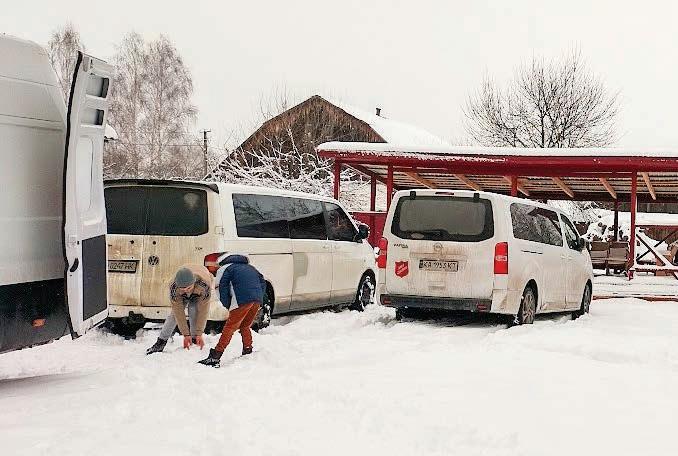
Residents of remote villages are enduring freezing weather without gas or electricity for heating.
The people in these villages are still recovering from the Russian occupation they endured before ukrainian troops liberated the remote area. Many homes have been destroyed, and there is no gas or electricity. There is only one employer remaining in the area, and many people have left.
“It is important that The Salvation Army in ukraine comes to the villages like these on a regular basis to support people in need with the resources available through our supporters and donors,” says Major Konstantin Shvab, who leads The Salvation Army in ukraine.
“It was great to see children and teenagers participating with great passion and enthusiasm in our events. It was also a great opportunity to express our love, tell them about the Good News and help the attendees to gain confidence that Jesus created the world for good.”
Learn for Work project
The Salvation Army Rwanda and Burundi Territory (administrative area) recently opened new buildings for the Kayenzi and Rukeri TVET ‘Learn for Work’ project. Lieutenant-Colonel Jean Laurore Clenant, who leads The Salvation Army there, reminded those gathered that education is a significant and key tool for sustainable development.
Among its community development strategies, the territory aims to empower young women and men with vocational skills for employment opportunities. These include advanced
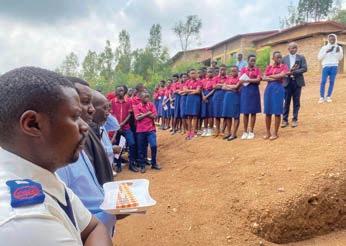
tailoring, advanced motor vehicle mechanics, driving lessons (theory and practical) and industrial skills.
7 INTERNATIONAL NEWS
24 F EBR u AR y 2024
Do we need rewilding?
Connecting with nature in a technological world
By Melanie-Anne Holland
I am amazed by the technology that connects us. I love that I am able to speak with my family on the phone, FaceTime friends overseas and join meetings with coworkers to collaborate around the world. The platforms seem endless. Our phones contain more computing power than the desktop I used in high school. We are more connected than ever before.
And yet, we can feel entirely disconnected and alone. What was intended to support humanity can become a sea of noise and demands while never offering us the homecoming our spirits long for.
Connection – personal, authentic, organic – is a human need. We need connection with God and with other people, and we need connection with the environment around us.
Connection – personal, authentic, organic – is a human need.
As I read the Bible, I see that connection is a theme woven through all the stories; that humanity and all of creation flourishes in healthy connection with God and each other. It starts with the very earliest of stories in the book of
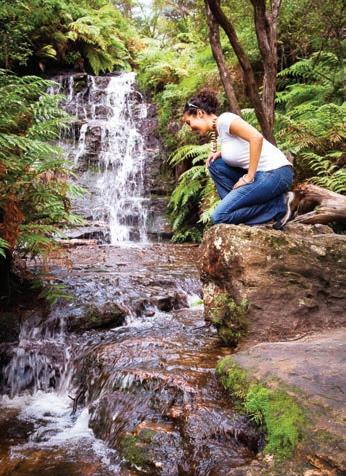
Genesis, where humanity is tasked with caring for the Garden of Eden (see Genesis chapter 2, verse 15). These early stories place us within nature, an important part of the ecological process.
It is no coincidence that as our lives become more disconnected with the systems that nurture us, people become more fractured physically, emotionally and spiritually. Science tells us what ancient wisdom has long professed; that reconnecting with nature is important to our wellbeing. Simply staring at the ocean can change our brain activity and bring us into a mild meditative state, the sea air increasing our serotonin levels
SALVOS MAGAZINE 8 FEAT u RE
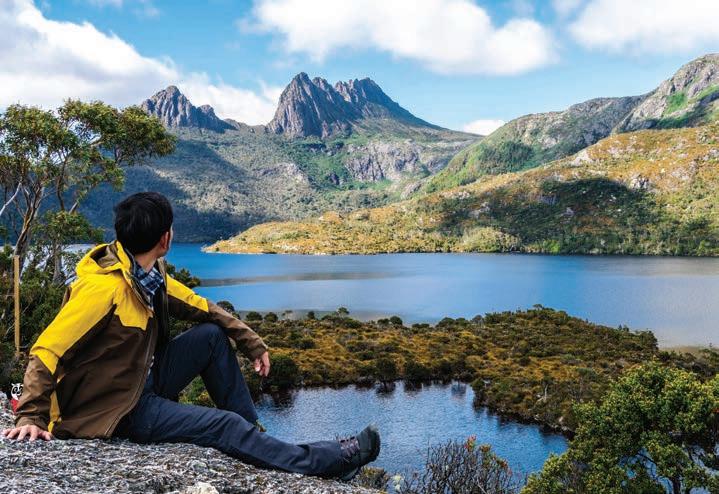
and decreasing anxiety. Similarly, walking in green spaces (such as bushland or parks) can reduce stress and symptoms of depression, improving cardiovascular health, immune system capability, concentration, memory and mood. Research shows that getting your hands dirty whilst gardening is helpful, as the bacteria in the soil cause our brains to release serotonin, helping us to feel happier and boosting our immune system.
Perhaps we need rewilding. We need to find ways to be ‘in nature’ rather than dominating spaces with our demands. We need to find ways to be alongside our native wildlife, helping them to flourish. We need to plant trees and clean waterways and protect beaches. And in caring for creation, we may find that we have become more connected and whole.
As World Wildlife Day is observed internationally on 3 March 2024, we are
each encouraged to think about what it means to connect people with the planet. Connection – personal, authentic, organic – cannot be replicated by technology, but perhaps technology can support us in our quest to find greater wellbeing and support the natural environment around us.
Major Melanie-Anne Holland is a Salvation Army officer (pastor) in NSW. She holds a Bachelor of Environmental Science (Hons) and degree in theology. Melanie-Anne is The Salvation Army’s representative on the Australian Churches Ecological Taskforce, as part of the National Council of Churches, Australia. Scan here for more stories of hope.
9 FEAT u RE
24 F EBR u AR y 2024
Preventing compassion fatigue
Caring for others, caring for self
By Alison Templar
“Then Jesus said, ‘Let’s go off by ourselves to a quiet place and rest awhile.’ He said this because there were so many people coming and going that Jesus and his apostles didn’t even have time to eat” (Mark chapter 6, verse 31).
How many of us can relate to this scenario? How often do you get home at the end of the day and think, “Why am I so hungry?” only to realise that you haven’t had lunch? There are so many people coming and going that need our help.
pour more and more of ourselves out to the people we care for.
Compassion fatigue can be described as the cost of caring. It is commonly experienced by people in the caring professions, and research shows that pastors/ministers are especially vulnerable to it. The challenge of listening and responding to stories of hardship and injustice repeatedly without becoming jaded or overwhelmed is real.
We only have so much that we can give of ourselves, and when those resources run low, we are at risk of compassion fatigue.
Sometimes we can absorb the stresses and traumas of the people we work with. I am reminded by my supervisor that the Good Samaritan (Luke chapter 10, verses 25-37) took the injured person to the inn and continued on his way. He arranged the best care for the man and did not have to provide that care himself.
TAKE A BREAK
Salvos are called to be “wherever there is hardship or injustice”. This is an infinite call, and yet our resources – personal, emotional, spiritual – are most definitely finite. When those resources run low, we are at risk of compassion fatigue.
BEYOND TIREDNESS
Compassion fatigue is much more than just feeling tired. Like erosion, it occurs over a long period; it accumulates as we
In our own power, our resources are not infinite. Jesus understood this, and he knew the importance of moving to a quiet space to rest awhile. We often read of him going off alone to pray. He needed time to connect with his father, share his heart, listen to God’s promptings and be refilled. He modelled this to his disciples, and Scripture describes it for us.
How are we connecting with God? How are we making space to listen to him? How are we letting him refill our jug so that we have the capacity to continue filling others’ cups?
SALVOS MAGAZINE 10 FAITH TALK

AVOIDING COMPASSION FATIGUE
These are the practical steps that work for me.
• Supervision and spiritual direction. Being able to step out of the busyness and have a person with whom I can be completely honest about my challenges and feelings, someone who can listen with compassion to me and bring me back to “Where is God in this?” is important.
• Being intentional about caring for my physical and mental health helps me bring my best self to the work I need to do. Regular doctor’s check-ups, a counsellor I can speak with when I need to and an exercise routine all help me care for myself.
• Retreating – once a year I try to attend a silent retreat. While this is not for everyone, for me it is a time to focus on God, to rest and to delve into Scripture without any distractions. It fills my jug in ways that I cannot describe.
The sad and yet beautiful irony of Jesus taking the disciples to a quiet space is that when they arrived, it wasn’t quiet at all. They arrived to a huge crowd who, we are told, were like sheep without a shepherd. Jesus and his disciples fed 5000 men and their families that day. This is the truth of ministry and caring for others. We can make the best-laid plans to care for ourselves on our own schedules. All too often, those schedules are thrown out the window. Prioritising our own care and connecting with God may mean seizing time when an opportunity presents itself rather than trying to schedule it. Caring for ourselves is just as important a part of our work as caring for others.
Lieutenant Alison Templar is a Salvation Army officer (pastor) in Melbourne.
Scan here for more stories of hope.
11 FAITH TALK
24 F EBR u AR y 2024
Heading H.O.M.E
Sarah now lives her ‘impossible’ dream
By Lerisse Smith
A harsh reality for many women who have experienced family violence is that securing a long-term private rental is all but impossible.
However, an innovative and pioneering Salvation Army pilot program, Heading H.O.M.E. (Holistic Outcomes Through Meaningful Engagement), is helping to transform the impossible into the possible. The program is giving women like Sarah* and her children the opportunity to transform their lives through support into long-term private rental.
“I came from a situation where I had no savings, no money to even buy food for the kids at times,” Sarah said. “Being a part of this program has helped me save for the future. I want to save and be able to buy a home for me and my children.”
BREATHING SPACE
Heading H.O.M.E has run since March 2023. The Salvation Army Family Violence Programs and Salvation Army Housing Victoria, along with five other organisations across the state have been funded through Family Safety Victoria to implement a pilot project to support exit pathways from refuge and crisis accommodation for victim-survivors of family violence in Victoria.
The aim of the program is for victimsurvivors to take over a lease at the end of the 12 to 16-month supported tenancy. It headleases properties, with women repaying the rent in a tapering model that helps give participants
financial breathing space while they get various matters sorted. The program also allows women to return to work once they are settled in a home.
“Many clients face huge challenges when it comes to securing long-term housing due to the ongoing effects of family violence,” said Bessie Campbell, Senior Family Violence Project Coordinator.
Annie and Sam … now have a place to call home.
“The greatest benefit of the program is that it supports victim-survivors to access long-term, sustainable housing options, a crucial factor in their recovery journey.”
DEMANDING RENTAL MARKET
Sarah and her children, Sam and Annie*, lived in short-term and long-term refuges for several months before joining the Heading H.O.M.E program.
Although Sarah had independently applied for rentals while in a long-term refuge, she had no savings or income, which had impacted her ability to compete in the market. She felt hopeless after receiving many rejections from real estate agents on her housing applications.
SALVOS MAGAZINE 12 M y STOR y

With the guarantee of 16 months’ rent in advance and the reassurance of support with her tenancy for that period, Sarah was accepted for a private rental through Heading H.O.M.E.
“I felt really lucky when I was finally approved for a rental property,” she said.
Sarah and her children had initially left their home with only one bag of clothes, so they had no furniture, whitegoods or other household essentials.
WELCOMING HOME
Through Heading H.O.M.E, an application was completed to a partner philanthropic organisation that could completely furnish the property.
“When I received the key and walked inside, it was so beautifully furnished. There was even a vase with beautiful flowers on the table, and it made me incredibly happy,” Sarah said.
“I have always only had used furniture or things that someone gave me. This is the first time I’ve had new furniture in the house.”
Now living in a stable home, Sarah was ready to start working. Heading H.O.M.E. completed a referral to another partner organisation that employs women in the construction industry. Sarah completed the relevant certificate in construction and was placed in a position that was flexible around her children’s school and understanding of her situation.
Annie and Sam are now settled well into their new school, with Sarah stating they are very happy that they now have a place to call home. At the end of her supported tenancy period, Sarah plans to take over the lease.
“I feel confident I now have the skills to continue managing my tenancy independently,” she said.
(*names have been changed)
Scan here for more information on Salvation Army services.
13 M y STOR y
24 F EBR u AR y 2024
Mixed seed bars
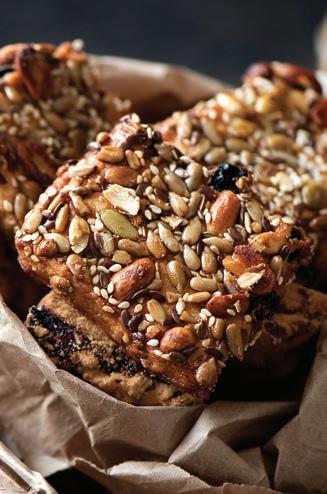
Ingredients
1 cup flaked coconut, ½ cup pumpkin seeds, ½ cup sunflower seeds, ¼ cup sesame seeds, ¼ cup chia seeds, ¼ cup flax seeds, pinch of salt, 1tsp vanilla, ½ cup honey (warmed)
Method
• Preheat oven to 150° degrees.
• Mix all dry ingredients together, stir through vanilla and warm honey until combined.
• Pour into lined, 20cm baking tray. Press firmly.
• Bake for 40 mins until golden.
• When cooled cut into bars.
Have a laugh
What steps do you take if a tiger is running toward you?
Big ones. She got too jumpy. He felt funny. Fish, because they stay in schools.
Why did the kangaroo stop drinking coffee? What happened when the lion ate the comedian?
What’s the smartest animal?
Signing In
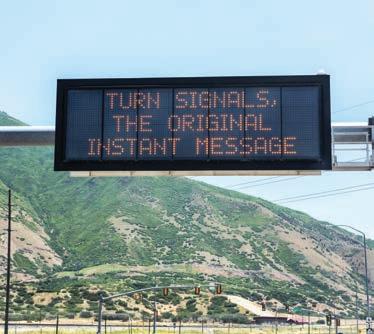
SALVOS MAGAZINE TASTE OF LIFE
24 F EBR u AR y 2024
On which page of this week’s Salvos Magazine is Tum-Tum hiding?

Bible byte
“Be kind and compassionate to one another.”
Ephesians chapter 4 verse 32a New International Translation
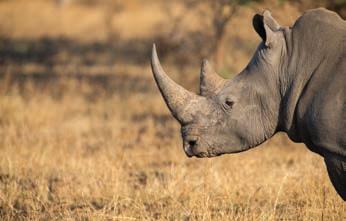
Quick quiz
1. Which animals are on the Australian Coat of Arms?
2. Which Australian animal is the world’s largest living marsupial?
3. Which Australian bird is known as the dancing bird?
4. How long does it take for a sloth to digest food?
5. What is a rhinoceros horn made of?
6. What is the only species of bird that can fly backwards?
Who am I?
I am a zookeeper, conservationist, television personality, wildlife educator and environmentalist.
I grew up learning about reptiles and was given my first python at age 6.
At the age of 9 I wrestled my first crocodile.
I have a star on the Hollywood Walk of Fame.
I have species of land snail named after me.
I was awarded a medal for service to global conservation and Australian tourism.
I am known as The Crocodile Hunter.
SudokuPuzzle #1 Puzzle #1
7 6 1 9 8 5 4 2 3 3 4 9 1 2 7 6 8 5 2 8 5 3 4 6 7 9 1 4 5 7 8 1 2 9 3 6 8 3 2 4 6 9 5 1 7 1 9 6 5 7 3 8 4 2 9 7 4 2 5 1 3 6 8 5 2 8 6 3 4 1 7 9 6 1 3 7 9 8 2 5 4
15 TAKE FIVE Quiz :answers 1. Emu and Kangaroo 2. Red Kangaroo 3. Brolga 4. About one month 5. Hair 6. Hummingbird Who am I? I am Steve Irwin :Tum-Tum is hiding behind the hiker on page 9.
Fill in the grid so that every row, every column and every 3x3 box contains the digits 1 to 9. 7 1 9 8 2 3 9 2 5 3 1 8 2 6 8 6 5 6 5 7 3 1 8 5 2 8 6 3 7 4 Solutions























